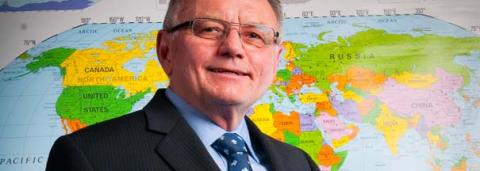Educating with Global Perspective in Mind
Dr. Kas Mazurek believes that understanding the profession of teaching begins with the understanding of other nations

This spring, a poster promoting Lethbridge Public Interest Research Group’s (LPIRG) 2nd Annual Student Speaker Challenge boldly asked: “What are you doing in university and what good is that to the rest of the world?” Although directed to all post-secondary students, in an era of globalization, this challenge has particular relevance for future educators.
A researcher with a special interest in comparative studies in the U of L Faculty of Education, Dr. Kas Mazurek emphasizes that, as an educator, understanding your profession begins with understanding the education systems of other nations. He is also adamant that we should never rely soley on the “knowledge and experience that local researchers, practitioners and education systems possess and generate.” Instead, we need to draw on the best practices from the widest pool of information.
“Professional knowledge is out there to be reinvented, in terms of successes and mistakes,” Mazurek says. Training teachers to compete in a global economy means “ensuring that they have an understanding of how educational objectives and practices work with other cultural components within a given society.”
Technology has, of course, made it convenient for us to draw from a much broader knowledge base and better understand all education systems and societies, including our own. But in order for future educators to fully understand what is required of them in professional practice, many choose to get global experience.
The Faculty of Education has placed practicum students in Africa, Europe, Australia and North America. The possibilities for teaching internships in international settings is essentially limitless and again technology plays a critical role: improving our ability to communicate between schools and faculties of education, enabling faculty supervisors to provide quality support to students without necessarily visiting that location. Mazurek has, however, travelled extensively throughout the world as a researcher and has been known to conduct supervision in this capacity.
Continuing, he points out that students can experience international placements approved by the Faculty of Education Field Experiences Office. They move forward by obtaining travel visas and work permits.
For Mazurek, refining knowledge and continual experimentation are fundamental and ongoing aspects of teacher education and practice. He’s immensely pleased to see that so many Faculty graduates have such an acute understanding of the value they have to offer the world, through international professional practica.
